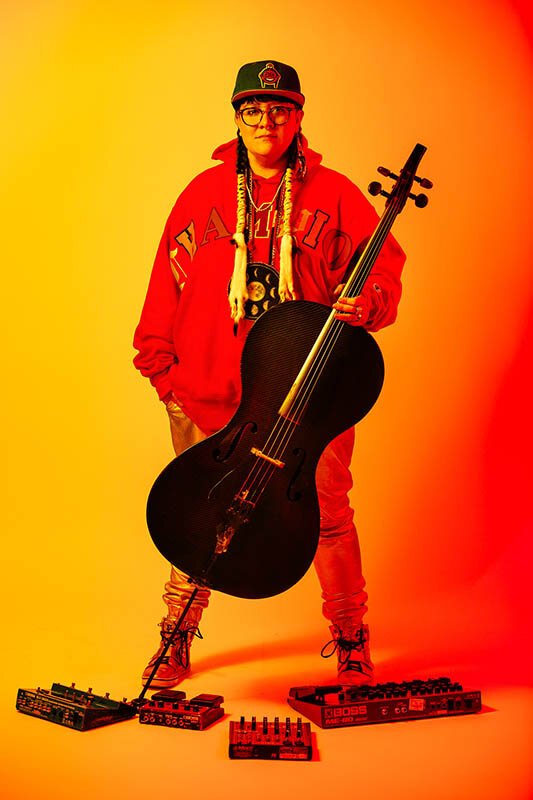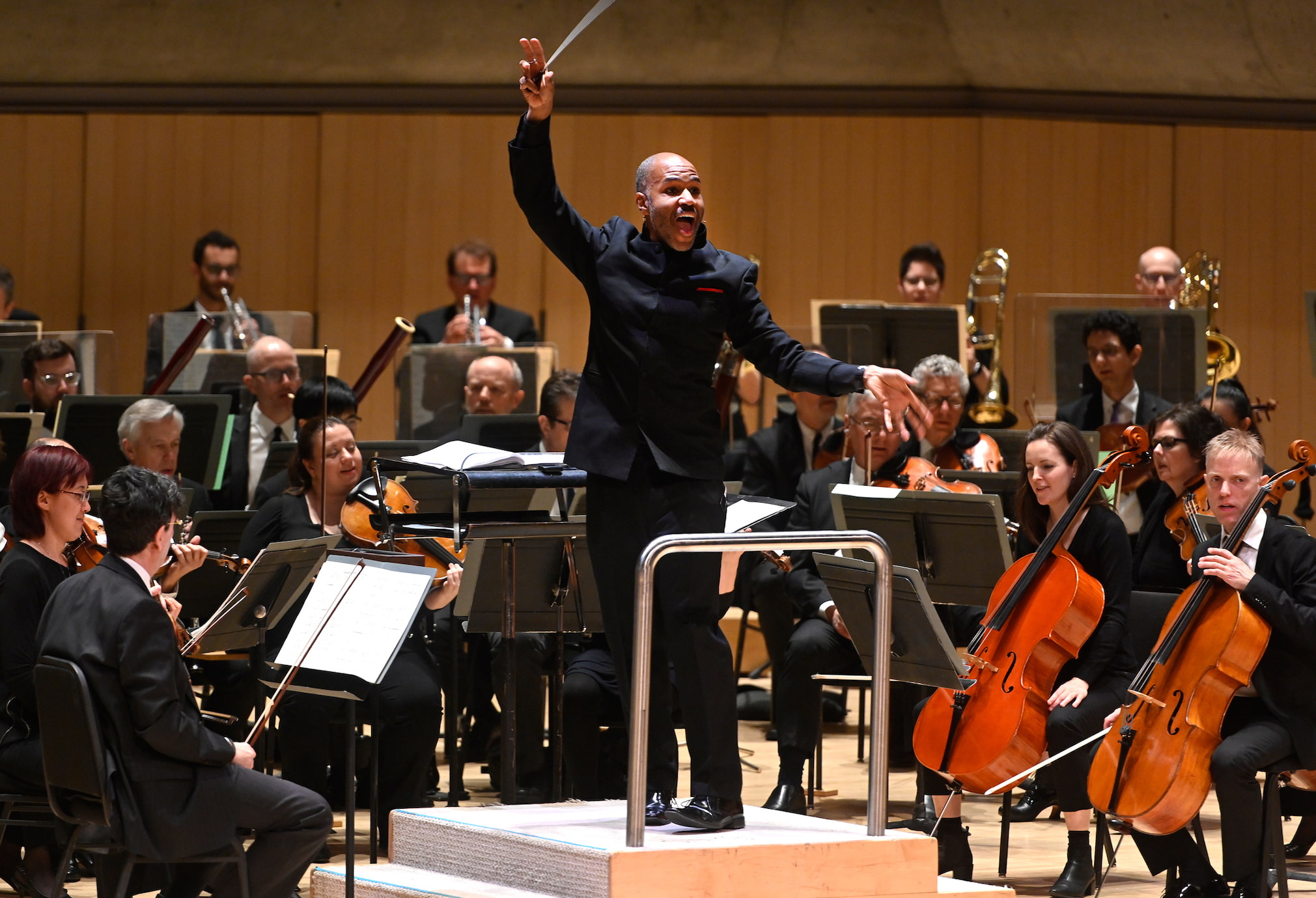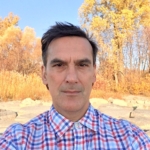Is Daniel Bartholomew-Poyser the future of classical music? A growing number of symphonies and institutions think so. Earlier this month, the San Francisco Symphony appointed Bartholomew-Poyser as resident conductor of engagement and education, joining the Toronto Symphony Orchestra (TSO) and Symphony Nova Scotia in giving the ebullient gay conductor critical outreach and educational roles. In addition, CBC Radio recently announced that Bartholomew-Poyser is the new host of its flagship classical music program Centre Stage.
Tasked with nurturing new audiences in his various jobs, Bartholomew-Poyser brings a passion for community to his attempt to break down the barriers and prejudices that often keep people—especially young people—from attending classical music performances.
“Music sneaks past our defences and reaches us in ways that other things can’t,” Bartholomew-Poyser says over the phone from his homebase in Toronto. “It provides communal opportunities for celebration and grief that are really important. And I’m not just talking about classical.”
Look no further than Canada’s first-ever orchestral drag show—one that featured RuPaul’s Drag Race alum Thorgy Thor, a classically trained violinist, performing with Symphony Nova Scotia—as evidence of the conductor’s game-changing approach. Those two 2018 concerts were sold-out successes, spawning a whole series of “Thorchestral” concerts across the country. But bridging the classical and drag worlds is just a small part of Bartholomew-Poyser’s expansive vision. He also conducted the TSO’s first relaxed performance, one designed to accommodate neurodiverse audiences who may not have felt comfortable enough to attend a live concert before. And he took a string quartet into a federal women’s prison. The TSO’s partnership with the YMCA in Toronto (including the queer and trans youth housing initiative Sprott House), the “Fusion Sessions” video series in Halifax and a forthcoming educational video project in San Francisco show how fighting forces of exclusion is something Bartholomew-Poyser takes to heart.
“Music sneaks past our defences and reaches us in ways that other things can’t.”
“I have often felt ‘other’ in my life,” Bartholomew-Poyser says in the 2019 CBC documentary Disruptor Conductor. “So people who are ‘other’ or who are othered by society… you are welcome at my concerts.”
Community—creating accessible, communal spaces for joy and grief—is once again front and centre in Bartholomew-Poyser’s life. After more than a year’s hiatus, Bartholomew-Poyser and the TSO return to live performances with Pride Together, two drive-in concerts of queer music postponed earlier this year due to COVID-19 restrictions.
“I wanted to do Pride Together because we’ve been apart during this entire pandemic,” Bartholomew-Poyser says. “The mental health issues for queer people who rely on their chosen family but weren’t able to get together are very significant. Coming out of the pandemic we need to be together.”
The concert will feature 20 or so members of the TSO and a number of special guests. It will be performed live, but also mic’d and projected on a big screen with the audience listening in their cars.
“The vibe at the drive-in concert is super fun because people are able to be with their friends and family in a private yet public way,” Bartholomew-Poyser says.
The program features an eclectic but accessible mix of new and old music written by queer composers, with works by Tchaikovsky and Saint-Saëns played alongside orchestral versions of Lady Gaga, Sister Sledge and Bartholomew-Poyser’s own arrangement of Madonna’s “Vogue.”

Credit: Tanja-Tiziana
One of the newer pieces on the program, “Round Dance,” is by Toronto-based Two-Spirit cellist and composer Cris Derksen, from their orchestral work Orchestral Powwow. “I love her music so mu-u-u-ch,” Bartholomew-Poyser enthuses. “I think Cris’s music is music you can hear for the first time and fall in love with. It’s tuneful and lyrical but challenging. And it’s fun with big climaxes.”
Another selection is a movement from Ethel Smyth’s 1883 String Quintet in E. “Smyth was somebody who was overlooked. She did a lot of work with women’s suffrage; she was actually imprisoned for her activism. She was also a member of the LGBTQ2S+ community. And we don’t hear her music. A lot of women composers were overlooked and didn’t have the opportunities to have their music performed, played, rehearsed and workshopped,” Bartholomew-Poyser says. “I wanted to do this piece, because this is just her as a musician, as a composer. It’s a fantastic little piece. People will be like, ‘Oh, how come we don’t know this composer?’ That’s a great question. That’s a great question.”
Bartholomew-Poyser was raised in Calgary in a religious Trinidadian household headed by two women, his mother and his aunt. There is a very moving section in the CBC Disruptor doc where he discusses his aunt’s death when he was 13. Bartholomew-Poyser didn’t have the words to describe the “heart-wrenching” grief he was experiencing. His aunt had died, but it was a second mother who was gone. “It imprisoned me, just shut me down. And I turned to music.” (In particular, Fauré’s Requiem.)
His mother adds that it wasn’t consolation, per se, that music provided, but a place where her son could just be with his feelings. It gave shape to his unstated grief.
Holding the unknowable, voicing the unnamable—that function of music surfaced a few years later when Bartholomew-Poyser was working as a music teacher at a private Christian school in Calgary. It was a difficult time for him: he was closeted during those 10 years and his dream of becoming a conductor seemed to be slipping away.
“When you are suppressing your actual desire, your voice, it affects all areas of your life,” Bartholomew-Poyser says in the documentary. “So when you are in the closet—as I was in the closet—it wasn’t safe for me to come out, I was afraid of coming out. And as much as I loved what I was doing, teaching the students, what I wanted was to be a conductor. What I wanted was to love other men, freely. That was absolutely not a possibility. I silenced myself. I silenced what I wanted.”
But Bartholomew-Poyser eventually found the strength to pursue his dreams, and to come out.
“There are young people who have not had the experience that I have of parental acceptance, to put it mildly,” he says. “And while a concert in no way makes up for that, obviously, my hope is that we can be one more pocket of refuge. Because that’s needed in a lot of people’s lives. It was needed in my life.”
That notion of music as a refuge is baked right into the Pride Together concerts, where Bartholomew-Poyser will talk up two queer refugee support groups, Rainbow Railroad and Rainbow Refugee. “This concert is about thinking of us as one big family all around the world, wherever we are. And if one of us is hurting, if one of us is not free, then we’re all not free.”
The Toronto Symphony Orchestra’s Pride Together concerts run Oct. 1 and 2. Bartholomew-Poyser’s first appearance with San Francisco Symphony in the 2021/22 season is a series of holiday concerts beginning Dec. 5.
Correction: September 28, 2021 9:01 amCris Derksen is not performing with the TSO for Pride Together; though their work is still part of the program. Incorrect information appeared in an earlier version of this story. Derksen’s next performance is with the Vancouver Symphony Orchestra on Oct. 15.


 Why you can trust Xtra
Why you can trust Xtra


